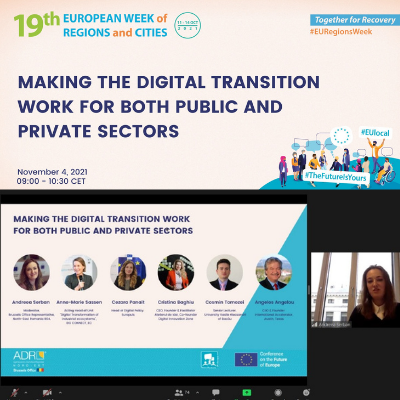The event featured different presentations from experts in digital transition. The first intervention was delivered by Anne-Marie Sassen, Acting Head of Unit "Digital Transformation of industrial ecosystems", DG CONNECT, who explained the importance of how both private and public sectors everywhere can benefit from digital transformation. For this achievement, she explained the initiative in the creation of the European Digital Innovation Hubs network with the support of the Members States and regions. The purpose is to support companies and public sector organisations in the digital transformation. European Digital Innovation Hubs will strengthen the regional ecosystem and bring organisations together to make the most of the technologies. She underlined the importance not only of regional development but also the network to have connection with the rest of Europe and the importance of the lessons which each DIH can learn from each other. She further explained the process of the creation of this initiative and the catalogue with all the DIHs across Europe. To finalise, she remarked that this initiative will work because there is a support from the European Union, from the Member States and from the regions. It also means that the coordination in these three levels focus on the investment and more impact while for the DIH themselves to understand the need of the regions, to use specialization, to do the best for the community and to know what is best for each region and the peer learning.
The second speaker was Cezara Panait, Head of Digital Policy, Europuls who talked about the perspective of civil society in digital transformation, the initiatives of the EU and how the situation is in Romania regarding digitalisation and innovation. They need the capacity to implement the digital tools by having the knowledge in digitalisation, therefore citizens want to improve their digital skills. Romania needs to invest in resources and projects in order to reduce the digital innovation gap with regions in different cities. She remarked the importance of looking to the future and new generations to bring the digitalisation and innovation to society, which has an important role. She finalised her intervention answering a question with the conclusion that there are still many issues to address, but the goals are ambitious and with the need of a strong partnership both in the private and public sectors.
An intervention by Cristina Baghiu, CEO, Founder & Facilitator Atelierul de Idei, Co-founder of Digital Innovation Zone followed. She started the presentation with an introduction of the Digital Innovation Zone and the region of Nord-Est Romania. This DIH wants to create opportunities and improve their digital skills. She talked about the ecosystem and the stakeholders along with the need to create real actions for the region. Relations with private sectors supported for example by the chamber of commerce and the regional development agency led them to reach out to a pool of SMEs. In the DIH, they are involved in different sectors such as agri-food, textile, health, tourism, etc. to support SMEs to develop opportunities to improve their competitiveness. She explained the platform they have as a network with funds and other partners. In this platform, they will target measures and create digitalisation focusing on digitalisation for the individuals.
Cosmin Tomozei, Senior Lecturer, University Vasile Alecsandri of Bacău then intervened. He analysed the general aspect of transformation of the public sector. He spoke about the concept of digital transition and the requirements to achieve it such as the theory of dynamical system supporting the stability in social and economic terms, the model stable in which the inputs, the output and the stages should be identified by public sectors, creating indicators, among others. He also explained the concept of dynamical system in digital transformation which evolves in time, change the actual state, system realized on the previous stages, therefore the actual states of the dynamical system depend on the system’s own story.
After the discussion he underlined the digital mechanisms they implemented in the University Vasile Alecsandri of Bacău, together with the organization and the engagement they have thanks to technology. He thinks universities were the first institutions that adopted online learning and technology with less effort since they had the necessary infrastructure.
The final speaker was Angelos Angelou, CEO, Founder of the International Accelerator, Founder and Principal Executive Officer of Angelou Economics. He started with an introduction of the growth and ecosystem in Austin, Texas. He gave some examples of different regions in digital transformation such as the example of Amsterdam with a smart city programme focused on the participation of people and residents benefiting the whole region. He divided the process of digital transition in 3 steps:
Technological aspects already implemented in all the countries.
Digitalisation, in the early stages.
Entrepreneurial participation.
He talked about digital equity, the necessity of flexibility in studies such as the coding studies in the USA and the importance of digitalisation for the population. To finalise, he underlined three concerns within this topic. Firstly, he talked about mindfulness in digitalisation, secondly about the artificial intelligence remarking that the human being has to remain in control of it always and about data protection through forensics. The world will have plenty of opportunities for new business models and development economy benefiting the smallest cities.
